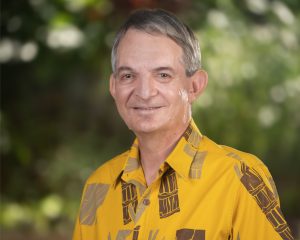Hilton Lewis steps down as director of Keck Observatory on Maunakea
The Board of Directors for the California Association for Research in Astronomy announced that Hilton Lewis, director of the W. M. Keck Observatory, will step down effective May 30.
Rich Matsuda, associate director of external relations for the Keck Observatory and
interim member of the Maunakea Stewardship and Oversight Authority, will assume the position of interim director while the board conducts a global search.
Lewis will step down following a 37-year career in the design, construction and operation of the facility and its twin 10-meter optical/infrared telescopes, including nine years as director.
During Lewis’ term as director, the Keck Observatory led the world in research productivity,
publishing more scientific papers per telescope than any other ground-based optical/infrared
observatory. It also continued to enhance its adaptive optics capabilities to better
compensate for blurring due to turbulence in the Earth’s atmosphere during this time.
Lewis oversaw the installation of a series of highly advanced new instruments atop Maunakea,
including:
- the Near-Infrared Echellette Spectrograph, designed to obtain a full near-infrared spectrum of a faint object in one setting
- The Keck Cosmic Web Imager, optimized for observations of faint, diffuse objects such as the intergalactic medium or cosmic web
- The Keck Planet Finder, which in November of last year achieved “first light,” capturing its first data from the sky and marking an exciting chapter in the search for Earth-sized planets around other stars.
Last year, Matsuda was appointed by then-Gov. David Ige to serve as an interim member of the Maunakea Stewardship Oversight Authority, which will assume Maunakea governance and management responsibility from the University of Hawaiʻi following a 5-year transition period.
Matsuda served as a member of the Maunakea Working Group that ultimately recommended the formation of the Maunakea Stewardship Oversight Authority, calling for a new governance and management structure involving community-based mutual stewardship and Native Hawaiian decision-making.
Over Matsuda’s 29-year career at the Keck Observatory, he was involved in the construction of
the Keck II telescope and has served in a series of roles including as chief of operations,
assuring the facility’s operational and organizational capacity to enable world-class science.
“There is no one better to lead and steward the observatory through this transition than Rich,” said Chair George R. Blumenthal, chancellor emeritus at the University of California Santa Cruz and director of the University of California Berkeley Center for Studies in Higher Education.
“He will ensure Keck continues to be a leader in the field of astronomical research, delivering on its mission of enabling world-class discoveries.”
Sponsored Content
Comments








